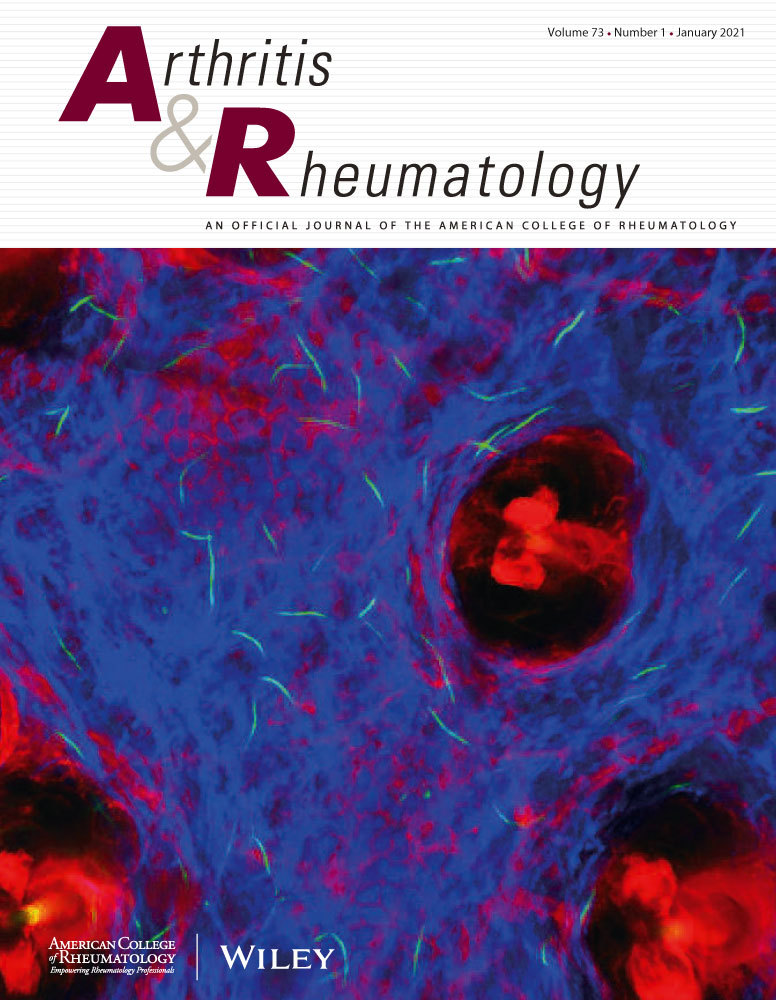肠道菌群类型对银屑病关节炎患者粪便菌群移植长期反应的临床意义
IF 10.9
1区 医学
Q1 RHEUMATOLOGY
引用次数: 0
摘要
目的:粪便微生物群移植(FMT)有望作为银屑病关节炎(PsA)患者甲氨蝶呤的有益补充。因此,我们研究了患者肠道细菌特征和供体菌株植入与FMT长期反应的关系。方法本探索性研究基于FLORA试验队列,包括31例中至高PsA疾病活性患者和4例FMT供体。在接受单一供体FMT的15例患者中,有13例被纳入按方案(PP)人群。在FMT前后(第4、12、26周)采集粪便样本。我们采用霰弹枪宏基因组学来表征肠道微生物群特征。结果基线时,17例(55%)患者的肠道菌群类型以拟杆菌属为主(b型),14例(45%)患者的肠道菌群类型为普雷沃氏菌驱动(p型)。B型和P型患者在疾病活动性和人口统计学上没有差异,但B型患者的物种多样性显著高于P型(P=0.005)。在PP人群中,7名b型患者中有5名,而6名P型患者中没有一名(P=0.021)在第26周达到长期临床有益反应。从基线到第4周和第26周,b型患者的细菌丰富度显著增加(P=0.016),而P型患者则无显著增加。到第26周,只有18株植入菌株在b型受体中持续存在,其中包括一株拟杆菌,它对关节炎疼痛和患者对疾病的总体评估显示出负效应大小。结论在一次FMT后,以拟杆菌属为主的受者更有可能获得长期有益的应答。本文章由计算机程序翻译,如有差异,请以英文原文为准。
Clinical Significance of Gut Microbiota Community Types for Long-term Response to Fecal Microbiota Transplantation in Patients with Psoriatic Arthritis.
OBJECTIVE
Fecal microbiota transplantation (FMT) holds promises as a beneficial supplement to methotrexate in patients with psoriatic arthritis (PsA). We therefore investigated how gut bacterial signatures in patients and donor strain engraftment associated with long-term response to FMT.
METHODS
This exploratory study is based on the FLORA trial cohort encompassing 31 patients with moderate-to-high PsA disease activity and four FMT donors. Out of fifteen patients receiving one single-donor FMT, thirteen were included in the per-protocol (PP) population. Stool samples were collected before and after FMT (week 4, 12, and 26). We performed shotgun metagenomics to characterize gut microbiota features.
RESULTS
At baseline, 17 patients (55%) had a gut microbiota community type dominated by the Bacteroides genus (B-type) while 14 (45%) had a Prevotella-driven community type (P-type). The B- and P-type patients did not differ in disease activity nor demographics, but the B-type had a significantly higher species diversity compared to the P-type (P=0.005). In the PP population, five out of seven B-type patients vs none out of six P-type patients (P=0.021) achieved a long-term clinical beneficial response at week 26. Bacterial strain richness increased significantly from baseline to week 4 and 26 in B-type (P=0.016), but not in P-type, patients. Eighteen engrafted strains persisted only in B-type recipients by week 26, including a Bacteroides clarus strain, which demonstrated a negative effect size regarding arthritis pain and the patients' global assessment of disease.
CONCLUSION
Recipients with a Bacteroides-dominated community structure were more likely to achieve long-term beneficial response following one FMT.
求助全文
通过发布文献求助,成功后即可免费获取论文全文。
去求助
来源期刊

Arthritis & Rheumatology
RHEUMATOLOGY-
CiteScore
20.90
自引率
3.00%
发文量
371
期刊介绍:
Arthritis & Rheumatology is the official journal of the American College of Rheumatology and focuses on the natural history, pathophysiology, treatment, and outcome of rheumatic diseases. It is a peer-reviewed publication that aims to provide the highest quality basic and clinical research in this field. The journal covers a wide range of investigative areas and also includes review articles, editorials, and educational material for researchers and clinicians. Being recognized as a leading research journal in rheumatology, Arthritis & Rheumatology serves the global community of rheumatology investigators and clinicians.
 求助内容:
求助内容: 应助结果提醒方式:
应助结果提醒方式:


